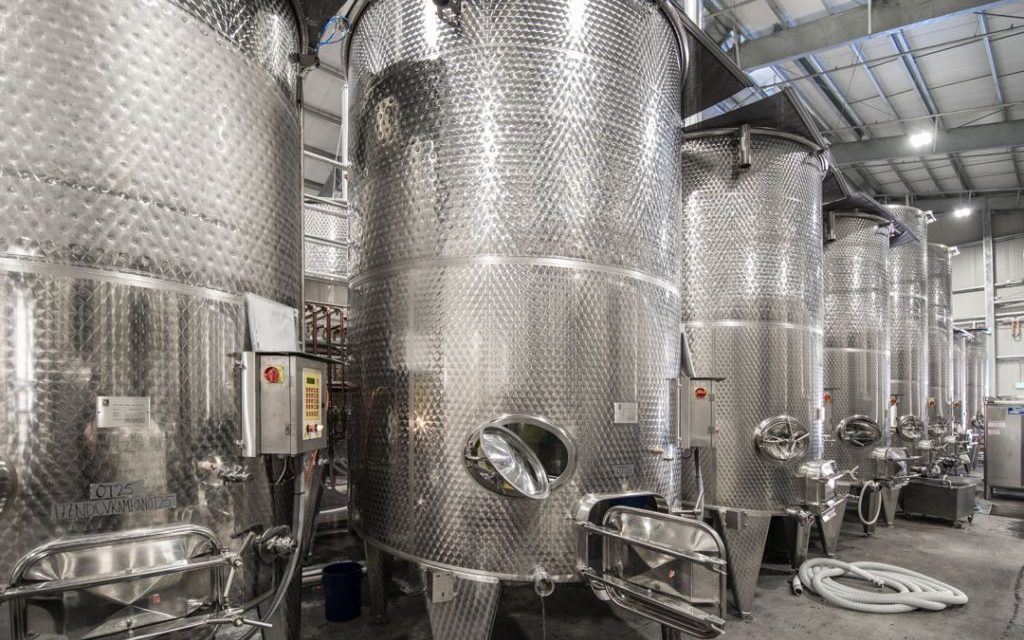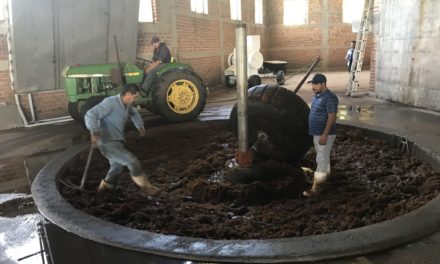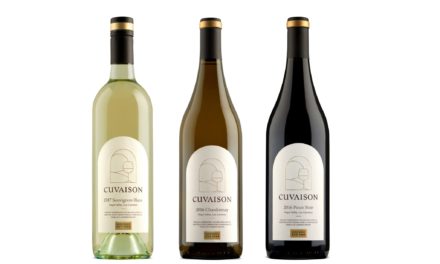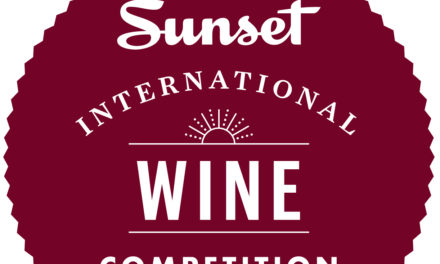With a surge of newer offerings in beverage industries, including hard seltzer, kombucha, THC- and CBD- infused drinks, many equipment providers that have traditionally focused on the wine industry are finding attention for their products from unexpected places. In turn, lead times for key items such as fermentation tanks and bottling lines have been higher than usual for many of these companies, with wine, beer, cider, spirits, and other beverage producers having to adjust accordingly. Spirited checked in with some of the key fermentation tank providers in the United States to learn what’s changing in this space.
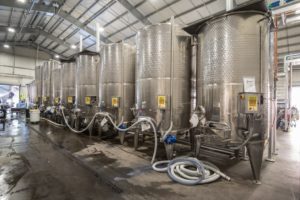
[Photo courtesy Prospero]
Prospero Equipment Corporation, with offices in New York, California, and Oregon, caters to a wide range of beverage producers and tends to provide turnkey solutions to its customers. Prospero carries stainless steel tanks from Škrlj d.o.o. in Slovenia, ranging from around 100 liters up to about 6,000 gallons (which is about the largest they can reasonably ship). Prospero also offers some tanks from the manufacturer of its stills, Barison Industry in Italy, as well as more budget-minded options produced in China. The company does keep some limited equipment and tanks onsite at its local offices and can do a modest degree of color customization and decoration on the tanks as well.
Nathaniel Maghanoy, who works in technical sales for Prospero, mentions automation as one of the main moving pieces lately. “Automated tanks, due to the cost of labor, are becoming really big, even for some medium-sized wineries,” he says. Key features include the ability to program daily punch-downs and pump-overs.
Westec Tank & Equipment Co. in Healdsburg, Calif., is focused more exclusively on wine tanks, catwalks, and related miscellaneous wine equipment, manufacturing stainless steel tanks. Tank size capabilities range from 1 gallon up to 160,000 gallons, and while Westec is primarily focused on wine, it also serves the olive oil, cider, and food industries (though no beer tanks—yet). The company focuses on providing detailed custom solutions to its clients, working to accommodate production needs and space limits. Westec can also provide onsite tank repairs and retrofits for U.S.-based customers.
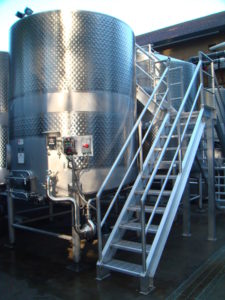
[Photo courtesy WesTec]
Euro-Machines Vineyard & Winery Equipment has offices on both U.S. coasts and offers tanks manufactured in Germany for the wine, beer, and cider industries. The company offers a wide range of tank configurations—including variable capacity, portable, stackable, and multi-chamber—and has customizable tank options ranging from 100 liters up to 15,200 liters. The company recently added a new oak fermentation tank combined with stainless steel—available in 3,000-, 5,300-, and 6,100-liter sizes—and also offers related wine-industry equipment such as Europress, crushpads, and crossflow filters.
Spokane Industries in Spokane, Wash., makes a wide range of industrial equipment, including stainless steel fermentation tanks for the wine, cider, beer, and distilling industries. Wine/cider tanks can be sized from 300 to 42,000 gallons, while custom-engineered brewing tanks are available at 80-barrel sizes or larger. Custom distillery tanks can be sized between 1,100 and 130,000 liters. Spokane recently introduced its CleanSweep No Entry Wine Fermenter, which is designed with a sloping bottom and a motor-driven sweep arm that eliminates the need to manually shovel grape pomace. Also new from the company is its egg-shaped stainless tanks.
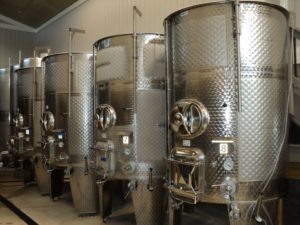
[Photo courtesy EuroMachines]
Criveller Group, with offices in California and Ontario, provides a full range of processing and production equipment to the wine, beer, spirits, cider, and olive oil industries. Its fermentation tank options include in-house manufactured tanks and as well as imported tanks from European suppliers. Criveller also maintains a modest amount of in-stock tank inventory on both coasts, accessible through the company’s website.
Stock Tank Options
Quality Stainless Tanks in Windsor, Calif., started in 1995 focused on custom stainless steel tanks for wine and beer, but a stock-tank program, added about eight years ago, has grown very quickly. For custom equipment, the company focuses on stainless steel tanks from 300 to 40,000 gallons and caters to a wide range of industries (wine, brewing, distilling, food, and pharmaceuticals). Its stock-tank program consists of designs ranging from a 500-gallon portable tank up to a 13,000-gallon storage tank.
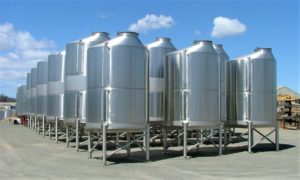
[Photo courtesy Quality Tanks]
St. Patrick’s of Texas operates a 50,000-square-foot warehouse in Taylor, Texas, and maintains what may be the largest inventory of stainless tanks in North America—more than 2 million liters of current tank inventory, ranging from 300 liters up to 14,000 liters. The company focuses on providing wine, food, and other beverage-industry tanks from Letina Group in Croatia, which it’s been working with for almost 15 years. It accepts online, phone, and fax orders, but warehouse walk-ins are by appointment only.
Custom concrete
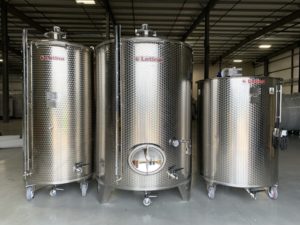
[Photo courtesy St. Patrick’s of Texas]
Sonoma Cast Stone currently makes tanks between 240 and 1,070 gallons, in addition to working on a set of modular tanks capable of handling approximately 28,000 gallons. SCC’s President Steve Rosenblatt notes that the company’s egg and amphora shapes are particularly popular; both are shaped so that the temperature differential between top and bottom of the fermentation tank encourages a gentle, constant circulation of the contents. For better use of space, SCC also offers conical, square, and tower tanks. Glycol lines can be built directly into the concrete, and the company’s multi-layer construction means the exterior can be customized in bold colors.
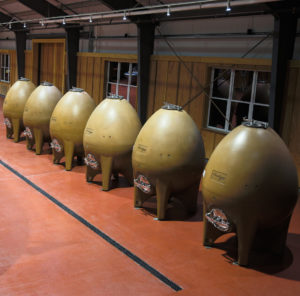
[Photo courtesy Sonoma Cast Stone]
One of the key points that came up repeatedly in talking with equipment manufacturers and providers is that their commercial landscape is changing fast these days—whether due to new markets opening up from non-traditional beverage sources, or from simply trying to meet the evolving needs of existing clients. New technologies, advances in automation, and changes to stock-tank availability all afford beverage producers greater operational flexibility, and these tank providers offer up a snapshot of how these interconnected industries are moving forward together.

